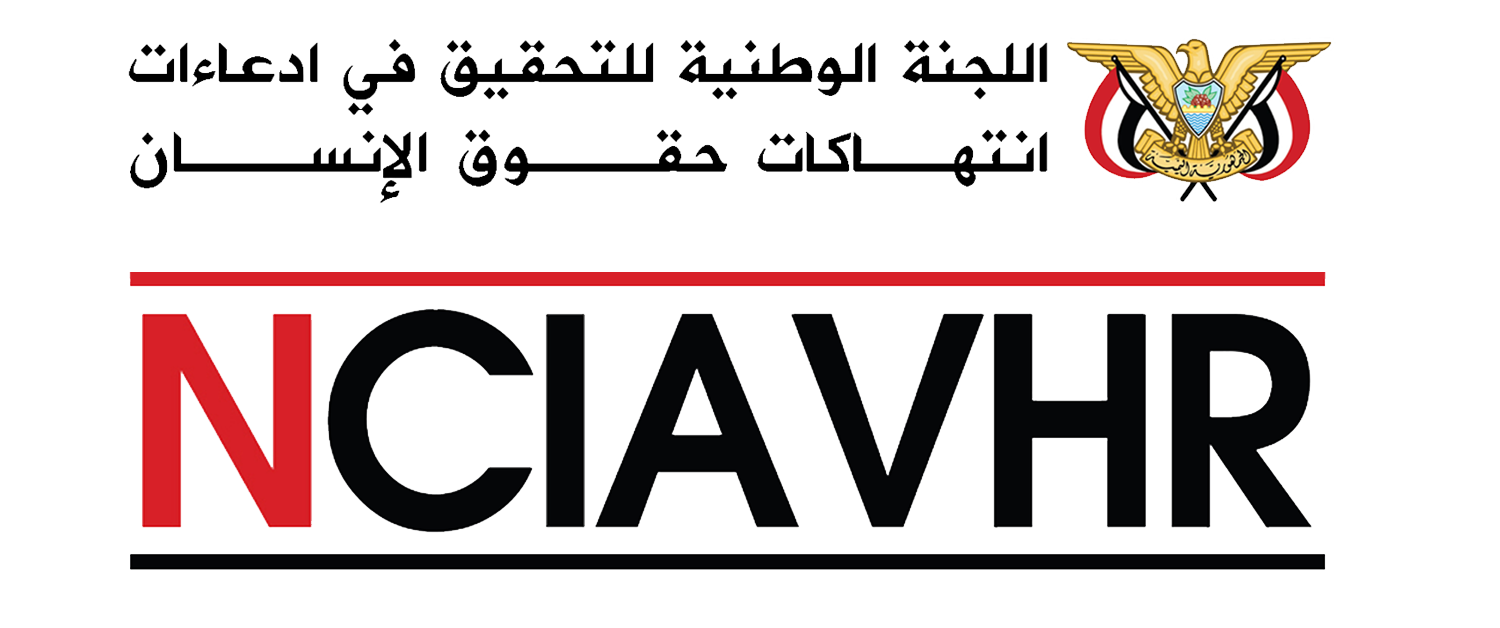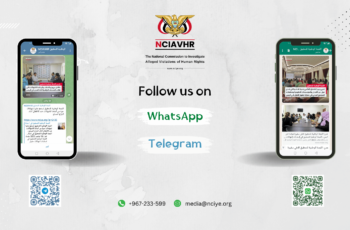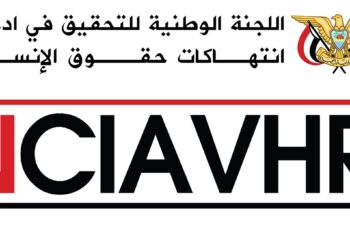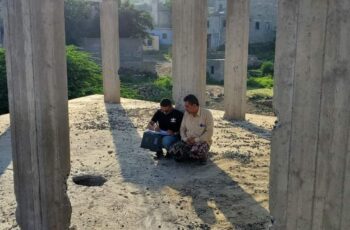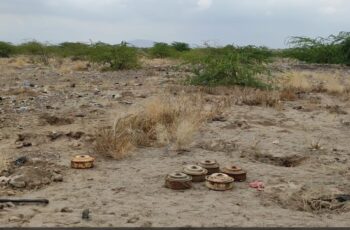Press Release on NCIVHR Works during 2022
The National Commission to Investigate Alleged Violations to Human Rights (NCIAVHR) is committed to informing national, regional, and international public opinion of the human rights situation in Yemen based on its accomplished actions during 2022. Therefore, the Commission presented, in this press release, an explanation of the most important works it have accomplished in investigating violations during the period from January to December 2022.
This year witnessed patterns of violations that have become chronic and systematic, especially with regard to the incidents of targeting civilians, arbitrary arrests, enforced disappearances, torture, restrictions on freedom of opinion and expression, and restrictions on women’s freedoms and public participation.
During the year 2022, the Commission completed the monitoring and investigation of (3,411) violations that occurred in various Yemeni governorates, in which (3,713) victims of both genders and all ages were affected, including (940) incidents of targeting civilians. (1,412) victims were killed or wounded, (447) dead, including (35) women and (82) children, and (891) wounded, including (84) women and (212) children.
The Commission also completed the investigation into the fall of (426) victims of mines and explosives explosions, including (23) women and (106) children, monitoring the arrest and disappearance of (968) victims, monitoring (17) incidents of targeting archaeological and religious objects, and (14) attacks. In addition, (1092) incidents of assault and destruction of private and public property, (131) incidents of recruitment of children under the age of 15 were monitored.
During the year 2022, the Commission’s field team completed the investigation into the bombing of (52) houses, the forced displacement of (144) families, and the monitoring and investigation of (87) extrajudicial killings. The Commission also listened to over (9,502) whistleblowers and witnesses of various types of the human rights violations that occurred in most Yemeni governorates and examined over (17,055) documents.
Despite the humanitarian truce that was announced in early April and continued until October 2 of the same year, the Commission noted the ongoing roll of deaths of civilians by various shells and bullets, the most prominent of which was in the districts of the governorates of Taiz and Al-Hodeidah, and other Yemeni governorates. In addition, the siege and the closure of the main roads of the governorate of Taiz were continued.
With regard to the incidents of landmine explosions affecting citizens in the safe passages that they use, the Commission recorded the death of (124) civilians due to the explosion of anti-personnel mines, including (15) women and (138) children, and (108) civilians were killed or injured, including (16) women and (23) children due to the sporadic shelling and sniping.
In completion of the direct investigation, the Chairman and (11) members of the Commission carried out a field visit to the governorates of Aden, Lahj, Taiz, Ma’rib, and Shabwa to investigate the incidents of targeting neighborhoods, residential gatherings and camps, and the fall of various projectiles on schools, medical facilities and farms. They also inspect the seam areas and the humanitarian situation of civilians in there.
During the field visit, a number of victims, their families, and eyewitnesses were heard, and meetings were held with officials of the local administration, directors of police, intelligence, political security, brigades and military axes, and the conditions of detainees, detention centers and various prisons in these governorates were examined and assessed.
Monitors of the Commission also carried out dozens of field visits to remote mountainous districts in the governorates of Al-Dhalea, Al-Jawf, Al-Bayda, Hajjah, Saada, Taiz, and Al-Hodeidah. They conducted direct interviews with victims of torture, looting of property, arbitrary dismissal and child recruitment in the governorates of Dhamar, Al-Mahweet, Amran and Amanat Al-Asimah.
In order to verify the effects of some grave violations on the direct and indirect victims, the Commission, during the year 2022, held more than (10) public, closed and individual hearings for victims of enforced disappearance, mine explosions, gender-based violations, and a number of victim journalists.
In the same context, the Commission held two meetings with the Joint Incident Assessment Team in its office in the interim capital, Aden, in which they discussed developing ways of cooperation with the team. The Commission also met with a number of witnesses and victims of some of the incidents that the Commission investigated, in addition to holding field visits to inspect some of the damaged sites.
In implementing the Republican Decree No. (140) of 2012 concerning the establishment of the Commission, the Chairman and members of the Commission met with the Chairman of the Presidential Leadership Council, Dr. Rashad Al-Alimi and handed him the tenth periodic report. As a result, a number of presidential directives were issued to all ministries concerned with raising the level of response to the Commission’s inquiries and facilitating its investigations and field visits.
In continuation of the cooperation with civil society, the Commission held workshops in the same year with CSOs working in monitoring and documenting violations in the governorates of Taiz, Aden and Marib. The Commission also held individual meetings with international organizations concerned with the application of international humanitarian law, protection of civilians, transitional justice and the UN Security Council sanctions committee team. Moreover, the Commission participated in a number of activities carried out by local civil institutions working in protection, peace and security.
In the field of accountability and follow-up by the Commission to the recommendations it received regarding the establishment of a court and prosecution specialized in human rights violations and intensive handing over files to the judiciary, the Commission held meetings with both the President of the Supreme Judicial Council and the Attorney General. In the meetings, they discussed opportunities to achieve accountability during the next year and the continuation of cooperation in the field of activating the role of judiciary and reducing violations.
In the framework of cooperation and coordination with the mechanisms and countries interested in the human rights file in Yemen, the Commission held an extensive meeting with over 20 ambassadors, diplomats and representatives of embassies of countries in Yemen. The meeting addressed the recent context of human rights violations and the work of the Commission in revealing the truth, limiting violations, and redressing the victims. In addition, the Commission held direct individual meetings with the Office of the High Commissioner for Human Rights, and direct and online meetings with representatives of the European Union and the United States of America.
An introduction to the progress it made, the Commission published (9) monthly press releases coinciding with a number of international events. It also published its tenth periodic report demonstrating the process and findings of the investigation for the period from July 2021 to July 2022. The content of the report and its outputs were presented in Geneva to a number of representatives of countries in the Human Rights Council and civil society organizations on the sidelines of the Commission’s participation in the 51st session of the Human Rights Council last September. As a result, the council’s resolution to renew its confidence in the Commission’s mandate and the continuation of its mission was published urging its support and facilitating its access to victims throughout Yemen.
As the Commission carries on the work of documenting the violations, identifying and holding the perpetrators accountable, and redressing the victims under the international standards applied by similar commissions of inquiry, it calls on all parties to the conflict to comply with international humanitarian law and international human rights law in protecting civilians in all Yemeni regions and to abstain for indiscriminate attacks.
The Commission also calls on all parties to the conflict to stop arbitrary arrests, enforced disappearances, torture, looting of property, and restricting the work of civil society and the participation of women in political, social, and working life. It also urges the international community concerned with the human rights file in Yemen to condemn human rights violations, identify the violating party, increase the volume of humanitarian aid to Yemen, and help the legitimate government to fulfill its legal obligations.
Issued by: The National Commission to Investigate
Alleged Violations to Human Rights (NCIAVHR)
Aden | Thursday, December 29, 2022
